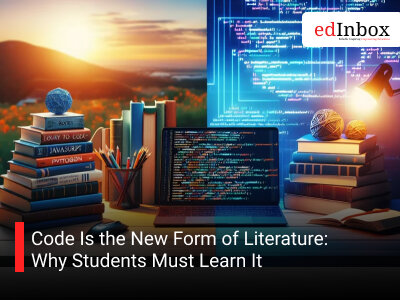Literacy in the 21st century is beyond reading and writing. Code, the secretive programming that is in charge of everything from mobile applications to Mars rovers, has silently assumed the role of this new literacy. In order to navigate and shape the digital world, students and teachers must learn to think in code, rather than simply consume technology.
The focus of coding is not only to make one a software engineer. It educates on managing problems, expressing ideas and thinking logically in a world that is data-driven. Nautaro (2018) once quoted a saying by author and investor, Naval Ravikant, who said, Coding is the new literacy. Individuals who read and write using this logical language will define what is to come and what is about to happen.
The New Literacy of Digital Era
Earlier, civilizations and societies were able to share stories and build their societies using written languages in the form of poetry, novel, novella, songs, etc. In the modern world, the purpose of code is the same, allowing ideas to become digitalized. Across industries, coding is directly shaping art, science, finance, and even politics. For instance, AI editing tools are used by filmmakers, Python scripts are used in the analysis of DNA by biologists, and the creation of interactive online lessons is done by a teacher, all with the help of code (directly or indirectly).
Code learning is not just a way to know how computers work, but it also provides an understanding of how thought processes work. Coding demands accuracy, patience and ingenuity, which is crucial in contemporary learning. When students debug a simple program, they are exposed to a training of logic and persistence to learn to keep repeating until they detect solutions.
Coding Is an Art of Expression
Code seems to most people to be mechanical, even cold. However, the reality is that coding is also one more storytelling. Poets, as much as they reuse words to create emotions, are programmers who are arranging logic to make ideas come to life be it in the form of game, application, or even artificial intelligence. One of MIT professors, Mitchel Resnick, a founder of Scratch, goes on to explain that coding is not only about solving problems, but also about expressing yourself and making things that matter to you.
The student who creates a mobile app on clean water awareness is not any less an artist than the novelist or painter. They are narrating a story with a code change digitally.
Why Students and Teachers should Learn to Code
Coding fluency is emerging as an important issue as language fluency. According to the reports by the World Economic Forum, by the year 2030, 85 percent of the jobs of the future will need to be digital, and many will necessitate at least some rudimentary skill in either programming or some kind of computational thinking. However, the vast majority of students leave without having any coding experience.
It is time schools redefined the meaning of being literate. In the same way that reading and writing were breaking minds in the Industrial Era, coding can unleash power in students of the ⁙ AI revolution. Coding is already being made a main subject at the primary levels by governments such as the UK, Singapore, and even Rwanda. This change was also appreciated in the National Education Policy (NEP 2020) of India- the policy promoted the development of computational thinking at the earliest level.
To the educators, the adoption of coding does not imply that one should drop the old subjects, but enhance them. Algorithms make Math interactive. Data visualization makes history interesting. Even art is developing with digital design. A teacher who teaches students to code learns together with the students forming a strong classroom of creators rather than consumers.
The Human Code Behind the Machine
Still, coding education isn’t only about writing syntax, it’s about ethics, empathy, and inclusion. As AI systems increasingly influence decisions in hiring, law, and healthcare, understanding how algorithms work becomes a civic duty. If literacy once helped societies hold governments accountable, coding literacy helps us hold algorithms accountable.
By teaching students to code responsibly, we teach them to question how technology shapes our values, privacy, and fairness. That’s the essence of modern civic literacy.
Coding Is the Literacy of Empowerment
In the end, the ability to code is less about machines and more about empowerment. It enables students to bridge imagination and impact, to turn “What if?” into “I built this!” The democratization of coding tools means anyone, from rural India to Silicon Valley, can now create a digital footprint. That is revolutionary.
So, as we enter the era of AI, we should redefine the role of education: not only to teach students to use technology but how to create it. Remember the time when words and literature changed the world? Now, code will!
What do you think about it? Share your thoughts in the form of a blog and get a chance to be featured on our site.
About the Author:
Kanishka, a versatile content writer and acclaimed poetess from Jabalpur, Madhya Pradesh, combines her passion for creativity with a strong commitment to education. Beyond crafting compelling narratives, she is dedicated to enlightening readers by sharing insights and knowledge they often don’t encounter elsewhere. She has been featured in several national and international online magazines, and anthologies. Her talent and dedication to literature have earned her two national records— one for composing the longest reverse poem and another for compiling an all-female anthology that celebrates women’s voices. Her love for storytelling, philosophies, and mythologies fuels her mission to inspire and educate, shaping minds through the power of words and knowledge.
Code Is the New Form of Literature: Why Students Must Learn It
Typography
- Smaller Small Medium Big Bigger
- Default Helvetica Segoe Georgia Times
- Reading Mode


